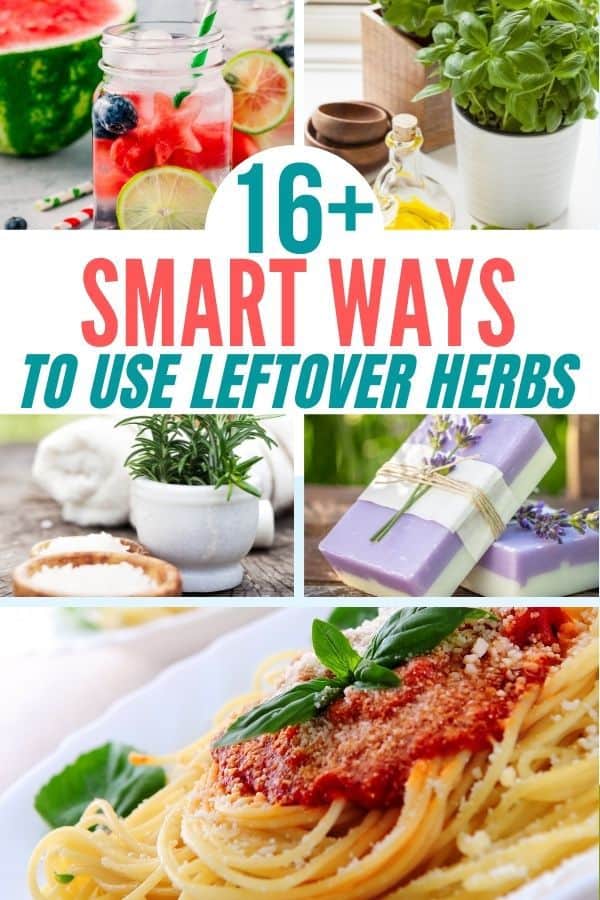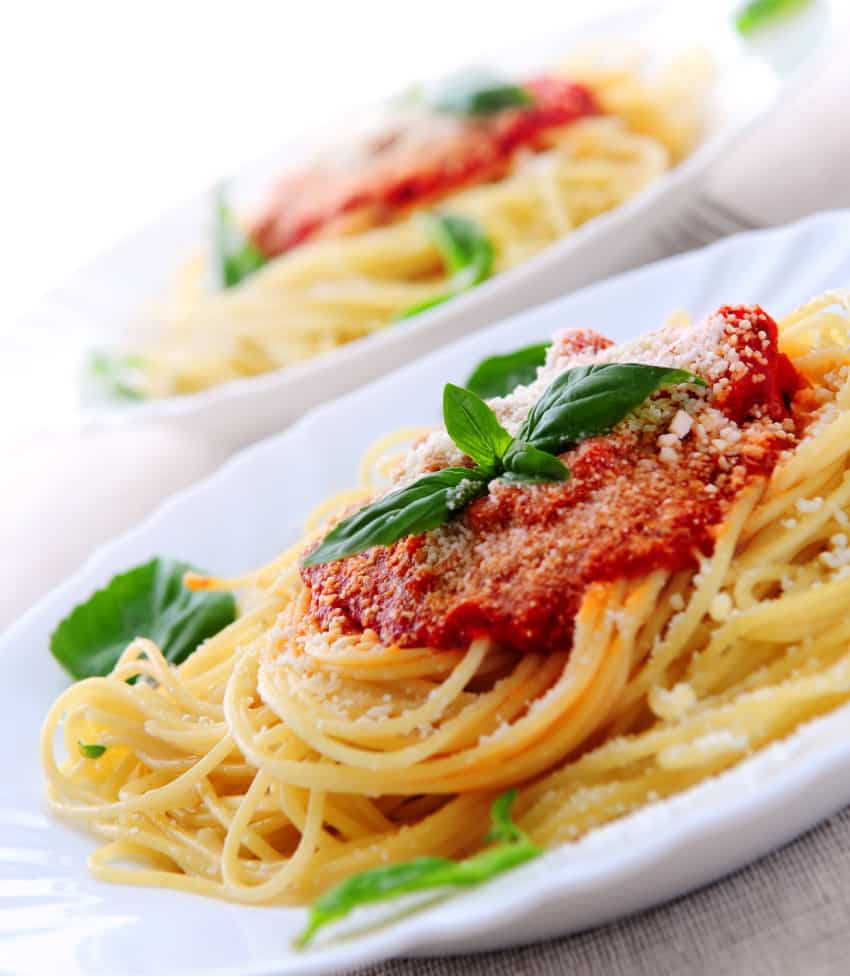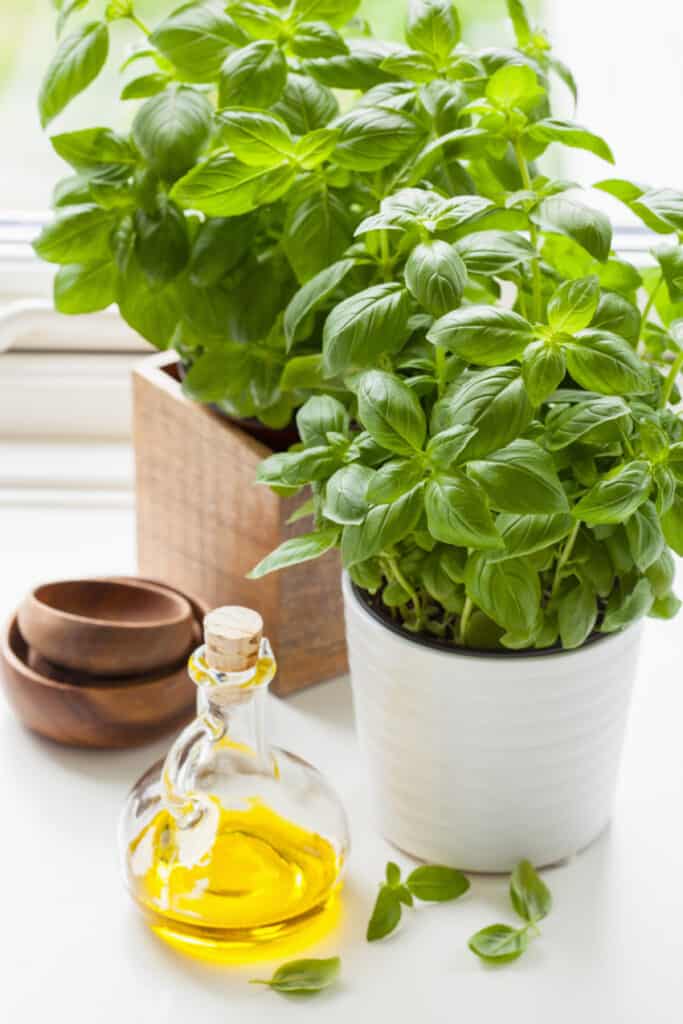Leftover herbs are an inevitability if you cook often and since they’re so pricey, you don’t want to throw them away! We’re sharing some simple ways to use leftover herbs to help you reduce food waste and make the most of your grocery budget.

The Best Way to Store Leftover Herbs
You’ve probably noticed that some herbs have woody stems (rosemary, thyme, sage, oregano), while other herbs have soft, green stems (basil, cilantro, tarragon, mint). This distinction is important when it comes to storage.
For both types of herbs, remove any leaves that are brown, yellow, slimy, or otherwise looking past their prime. Store tender-stemmed herbs in a mason jar or glass with an inch or two of water at the bottom (enough to cover the stems, but not submerge the leaves). Place them on a shelf in the fridge until you’re ready to use them.
Herbs with woody stems (also known as hardy herbs) should be wrapped in a damp paper towel, then placed in a plastic bag or layer of plastic wrap. Pop them in the fridge—or even the freezer if you want to keep them on hand for a while!
Learn more: How To Store Fresh Herbs

Ways to Use Leftover Herbs in the Kitchen
Make Syrups for Lemonade and Cocktails
If you know how to make a simple syrup, you know how to make herb-infused syrups! Use them to upgrade your lemonade or homemade cocktails, or drizzle them on fresh summer fruit for an easy dessert. Combine a cup of sugar and a cup of water in a saucepan and add a handful of fresh herbs. Bring the mixture to a boil and stir; once the sugar has dissolved, reduce to a simmer for a minute, then remove from heat and let the herbs steep until the syrup has cooled. Strain the syrup into a glass bottle and refrigerate for up to a month.
Make Infused Water
You know how spas serve water infused with herbs, fruit, and cucumber slices? You can totally do this at home with your leftover herbs. Sprigs of rosemary, thyme, or basil are excellent when paired with half a lemon or orange slices. Keep your infused water in a glass pitcher in the fridge for a day or two.
Upgrade Your Next Meal
Herbs with woody stems can be tossed onto a sheet pan when you’re roasting vegetables or baking chicken, fish, or pork. Brighten up the flavor of canned tomato soup with fresh basil, add chopped cilantro to store-bought salsa or guacamole, top baked potatoes with chives, or stir in minced oregano to a jar of pasta sauce. The possibilities are endless!
Add It to Homemade Stock
The next time you’re simmering a pot of chicken, vegetable, or beef stock on the stove, toss in a few sprigs of rosemary, thyme, or sage. In addition to being a great way to use leftover herbs, it’s also an opportunity to use onion peels, leftover garlic cloves, bones, ends from carrots and celery, etc.
Whip Up an Easy Pesto
Basil, parsley, mint, and cilantro can all be used to make homemade pesto. You don’t need a recipe, either—just add and adjust ingredients as you go along. At a minimum, you’ll need olive oil, a nut or seed, an herb, and salt. Grated parmesan can be added too and lemon juice or zest can brighten up the flavor.
Make Your Own Dried Herbs
Delicate soft-stemmed herbs like cilantro, parsley, chives, and basil are best dried in a food dehydrator. Oregano, sage, thyme, and rosemary can be tied into bunches and then hung upside down in a dark, dry area. Once the leaves are completely dry, crumble them and store them in small jars.
Make Herbed Salts
Use a cup of kosher salt for every half cup of herbs you have; give them a few pulses in your food processor for an herbaceous salt to season fish, veggies, chicken, and more.
Flavor Your Olive Oil
You don’t have to shell out for those expensive infused oils at gourmet stores—you can make your own! Combine a half cup of olive oil with a few sprigs of herbs and simmer them on low heat for 5 minutes. Once the oil has cooled, pour it into a small bottle, along with the herbs. Refrigerate and use within a month.
Make Flavored Compound Butter
Combine a stick of softened butter with one to two tablespoons of minced fresh herbs and a minced clove of garlic. Transfer the mixture to a sheet of parchment paper, roll the butter into a log, and chill for at least 3 hours. We love compound butter with biscuits, corn-on-the-cob, and baked potatoes, but it’s great with just about any vegetable!
Fancy-Up Your Fruit
Serve slices of watermelon with thinly sliced basil, mint, or cilantro. Basil also pairs well with berries and stone fruits. Thyme complements peaches and plums—try grilling these fruits, then drizzling slices with a good, syrupy balsamic vinegar and sprinkling minced thyme on top.
Cook a 15-Minute Pasta Dinner
Who needs pasta sauce? Heat some butter or olive oil in a skillet and stir in cooked pasta, sliced garlic, and some of your leftover herbs. Serve with steamed veggies and rotisserie chicken.

Other Ways to Use Leftover Herbs
Make Herbal Bath Salts
Rosemary and thyme are great additions to a relaxing bath! Combine a few tablespoons of herb leaves with two cups of Epsom salt and 6 drops of essential oil (lemon is good if you want an uplifting fragrance, while lavender is perfect for when you want to unwind). To make cleanup easy, scoop your bath salts into a sachet when you’re ready to use them, then put the sachet in the tub.
Infuse Vinegar for Cleaning
Cleaning vinegar is an inexpensive, eco-friendly way to keep your home clean, but let’s be real: it kind of stinks. Combine herbs and citrus peel in a mason jar, then fill the jars with boiling hot white vinegar. Let cool, then cover and store in a cool, dark place for a day. Strain the mixture and transfer to a glass spray bottle. The herb and citrus scents will infuse into the vinegar.
Simmer to Scent Your Home
Woody herbs like rosemary and thyme can be simmered on the stovetop with lemon or orange slices to add a subtle, fresh scent to your kitchen. This might just be the simplest way to use leftover herbs! (I also love using air purifying plants to keep the house fresh!)
Make Melt-and-Pour Soaps
Minced thyme and rosemary add gentle exfoliation to homemade soaps. Start with a melt-and-pour base, add essential oils for fragrance, and stir in herbs before pouring the mixture into soap molds.
Grow More Herbs
You can use your herbs to grow more herbs! If your herbs are super fresh, you can stick them in a glass of water (stems only—pull off any leaves that would be submerged) and put them in a sunny spot. After about a month, roots will grow and you can pot the herbs or plant them in your herb garden.








